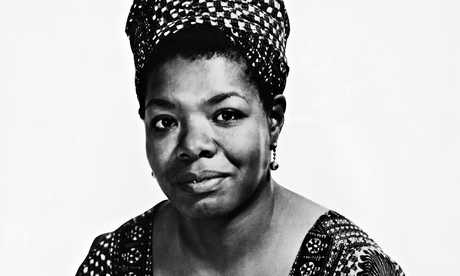Maya Angelou said she had thousands of daughters. I wonder if she ever knew really how many

Maya Angelou in 1972: 'She called it like it is.' Photograph: Everett Collection/Rex
Maya Angelou said often that although she gave birth to one son, she had thousands of daughters. "I have daughters who are black and white, Asian and Spanish-speaking, and native American," she said. "I have daughters who are fat and thin, pretty and plain, gay and straight. I have all sorts of daughters who I just claim. And they claim me."
I wonder if Angelou ever knew really how many – girls who were told about her, named after her, or like me, growing up in a suburban corner of England, clinging fiercely to her books and even when not reading them, inhaling the spirit of her struggle from the titles alone: A Song Flung Up to Heaven, I Know Why the Caged Bird Sings and Gather Together in My Name.
Although I loved and admired Angelou as a writer – her novels and poems all languishing playfully somewhere on her rich southern spectrum between poetry and prose – it was the content of her writing that had most power over me. Here was a woman – alive during my lifetime – who had been raised in the America of "Chitlin' Switch, Georgia, Hang 'Em High, Alabama; Don't Let the Sun Set on You Here, Nigger, Mississippi."
As the structural injustice of race has became more subtle and sophisticated during her lifetime, she called it like it is. Her comment on 9/11? "Living in a state of terror was new to many white people in America, but black people have been living in a state of terror in this country for more than 400 years."
Here was a woman who talked about lesbians, teenage pregnancy, feminism and womanism, smoking, drinking and cursing (when she realised it was her destiny to be a great woman, she told Oprah Winfrey she thought: "Maybe I should stop smoking, and stop drinking, and stop cursing. Well I did stop cursing… "). She was not a historical relic, but a living, breathing one-woman phenomenon. She gave me a language of identity and purpose that radiated as much from her very existence as it did from her work.
The book that had the most impact on my life was All God's Children Need Travelling Shoes – the fifth instalment in her series autobiographies – about the time she spent in Africa during the civil rights movement. Initially married to an ANC member, her immersion in the struggle of black people reads like a who's who of other greats, her relationships with James Baldwin, WEB du Bois, the Ghanaian poet Efua Sutherland, Malcolm X and later Martin Luther King.
In Ghana she was part of a community of African Americans – a returnee movement that gathers strength to this day – but her travels stand out as an act of defiance against the view perpetrated by many then, and to this day, that Africans and people of African descent in countries like the US have nothing in common. She didn't just live it, she wrote about it, warts and all. "If the heart of Africa remained elusive, my search for it had brought me closer to understanding myself and other human beings," she wrote, words that spoke vividly to me as a recent returnee to Ghana myself. "The ache for home lives in all of us, the safe place where we can go as we are and not be questioned."
My three-year-old daughter knows about "Auntie Maya" – asks about the thick tones of her generous voice, the alarming gash of her deep, wide smile. "Was she really an Auntie, mummy?"
Yes, she really was.
Afua Hirsch is social affairs and education editor on Sky News
I wonder if Angelou ever knew really how many – girls who were told about her, named after her, or like me, growing up in a suburban corner of England, clinging fiercely to her books and even when not reading them, inhaling the spirit of her struggle from the titles alone: A Song Flung Up to Heaven, I Know Why the Caged Bird Sings and Gather Together in My Name.
Although I loved and admired Angelou as a writer – her novels and poems all languishing playfully somewhere on her rich southern spectrum between poetry and prose – it was the content of her writing that had most power over me. Here was a woman – alive during my lifetime – who had been raised in the America of "Chitlin' Switch, Georgia, Hang 'Em High, Alabama; Don't Let the Sun Set on You Here, Nigger, Mississippi."
As the structural injustice of race has became more subtle and sophisticated during her lifetime, she called it like it is. Her comment on 9/11? "Living in a state of terror was new to many white people in America, but black people have been living in a state of terror in this country for more than 400 years."
Here was a woman who talked about lesbians, teenage pregnancy, feminism and womanism, smoking, drinking and cursing (when she realised it was her destiny to be a great woman, she told Oprah Winfrey she thought: "Maybe I should stop smoking, and stop drinking, and stop cursing. Well I did stop cursing… "). She was not a historical relic, but a living, breathing one-woman phenomenon. She gave me a language of identity and purpose that radiated as much from her very existence as it did from her work.
The book that had the most impact on my life was All God's Children Need Travelling Shoes – the fifth instalment in her series autobiographies – about the time she spent in Africa during the civil rights movement. Initially married to an ANC member, her immersion in the struggle of black people reads like a who's who of other greats, her relationships with James Baldwin, WEB du Bois, the Ghanaian poet Efua Sutherland, Malcolm X and later Martin Luther King.
In Ghana she was part of a community of African Americans – a returnee movement that gathers strength to this day – but her travels stand out as an act of defiance against the view perpetrated by many then, and to this day, that Africans and people of African descent in countries like the US have nothing in common. She didn't just live it, she wrote about it, warts and all. "If the heart of Africa remained elusive, my search for it had brought me closer to understanding myself and other human beings," she wrote, words that spoke vividly to me as a recent returnee to Ghana myself. "The ache for home lives in all of us, the safe place where we can go as we are and not be questioned."
My three-year-old daughter knows about "Auntie Maya" – asks about the thick tones of her generous voice, the alarming gash of her deep, wide smile. "Was she really an Auntie, mummy?"
Yes, she really was.
Afua Hirsch is social affairs and education editor on Sky News

No comments:
Post a Comment